#africa spies
Text
A North Africa Story: The Anthropologist as OSS Agent 1941-1943: With Historical Settings from the Editors of Gambit :: Carleton S. Coon
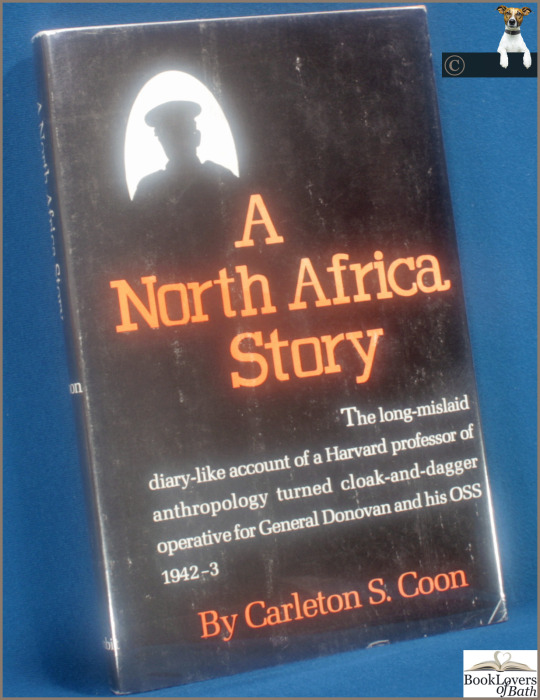
View On WordPress
#0-8764-5108-3#africa spies#african history#american military intelligence#american secret service#autobiographies#books by carleton s coon#central intelligence agency#diaries#first edition books#history africa#joint intelligence center#journals#memoirs#military biographies#military biography#military history#military intelligence division#oss#raf#royal air force#secret intelligence#special operations executive#spies united states#united states strategic services
0 notes
Text
So I Hear You Liked...World War Two Dramas
What's that? You said you wanted a World War Two series where women actually speak to each other? Have I got a deal for you!
When Band of Brothers first came out, I did not have cable, but what I did have was a card at a library that owned seemingly every PBS drama ever broadcast. I know and love a lot of these shows, and I hope you do, too.
As we wait for Masters of the Air to join us, maybe you can fill some time with one of these!
Classic: These shows were made in the 70s and 80s and while the production values are not the same as something made more recently, they're all fun to watch.
Danger UXB - daily life in a bomb disposal unit.
Dad's Army - comedy show about the Home Guard.
Hogan's Heroes - situational comedy about life in a POW camp.
Piece of Cake - follows British pilots stationed in France as the Phony War begins.
Homefront Perspectives:
✨Housewife, 49 - Based on the wartime diary of Nella Last, who participated in the Mass Observation project. One of my favorites.
✨Foyle’s War - procedural crime drama following DCS Foyle and hsi team as he solves murders in wartime Britain. Another favorite.
Island at War - Wartime life on the Channel Islands during the German occupation
Land Girls - Follows the lives of a group of Land Girls working on an estate farm.
Bomb Girls - Follows the lives of a group of workers in a Toronto munitions factory.
Home Fires - Life in a small British town near an air base. Based on a book.
World On Fire - Follows the disparate lives of several people in several countries as the war begins.
✨All Creatures Great and Small - The life of Yorkshire Vet James Herriot, based on the book series of the same title. A favorite, both the 1970s original and the 2020 version.
A French Village - Daily life in a French village is upended as the Germans invade. Follows the same village through the entire war.
My Mother and Other Strangers - An Irish village deals with the introduction of an American Air Force base.
Colditz - life in one of the war's most infamous POW camps. Features Damian Lewis!!
Atlantic Crossing - the life of Crown Princess Marta of Norway as she tries to advocate for her country while living in the United States.
The Halycon - Life in a posh London hotel during the 1940s
Spies and Science:
X Company - Canadian drama about life overseas for spies
Resistance - French wartime drama about a woman in the French underground movement
Restless - Postwar drama about a woman who spied for the Russians in England during the war.
✨Manhattan - If you liked Oppenheimer, have I got a show for you!! Follows the lives of several scientists and their families as they move to Los Alamos. A favorite.
✨The Heavy Water War - Norwegian/British operations Grouse and Gunnerside to destroy German heavy water plant. A favorite.
The Twelfth Man - Norwegian sabotage operation gets shot down in occupied Norway.
✨Generation War - German experience of war from variety of perspectives. This show is excellent. Everyone should watch this.
✨SAS: Rogue Heroes - Follows the foundation of a parachute regiment in North Africa that would eventually become the basis for Britain's commando units. A favorite.
Postwar:
A Place to Call Home - very soapy Australian post-war drama about an upperclass family.
Our Wonder Years - Follows three sisters in post-war Germany as they attempt to confront the past.
Tannbach - Follows a family whose German town is split in two along the new East-West border.
The Defeated - Crime drama following a policeman trying to find his brother in post-war Berlin
Small Island- a Jamaican woman moves to London after the war and tries to adjust to a country that doesn't want her there
Call the Midwife - Social drama in the 1960s addressing the health and lives of the post-war poor of London.
191 notes
·
View notes
Text
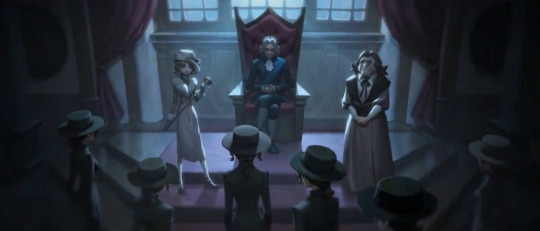
Theory: about Vilhelm, Alice, Orpheus, the final game, and who made the assassination request
The organization Vilhelm has had Evelyn train and grow for him, an organization (skilled in secrets, deception, disguise, and the like) which included women like Martha Behamfil, are highly likely to be the ones spying on Alice, who had been adopted and taken to Melbourne by Vilhelm for his experiments until she managed to escape with Orpheus' help. Vilhelm likely wasn't happy by this, which would explain why he might've sent his spies to find and investigate her. They were eventually exposed though, leading to their recommendation the target be "eliminat[ed]".
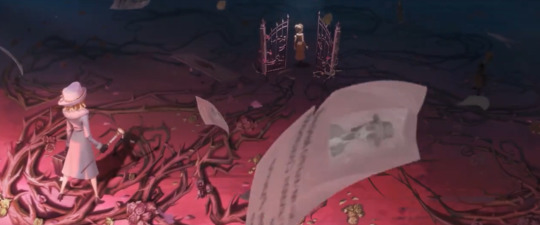
This could be when Vilhelm made the assassination request. Possibly because he couldn't let any information about his secret organization leak (or anything else bad he might've done), which could've been her intent eventually considering she decided to be an "investigative journalist" (solving mysteries and reporting on her findings).

And considering based on this we know Vilhelm was recommended to eliminate her, that would relate to the "assassination" request we knew Norton was given. This was the reason Norton went to the manor (for the final game), meaning the 2 options (so far) are Melly or Alice, and if the request came from Vilhelm, Alice is the more likely answer.
Melly on the other hand I think may currently be blackmailed by Orpheus, who I think found out about what she did to her husband, and thus why he would've sent her the same "rare" bee specimen that caused his death (implying he knew the truth).
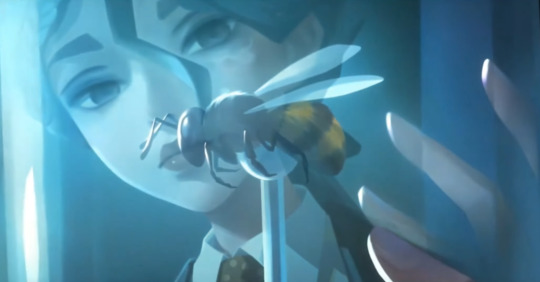
I think everything Melly said is technically true (maybe could call it a lie of omission). She is here due to her husband's death, which was caused by a "type of rare bee venom" that wasn't recorded in his observation notes. And she did likely receive a bee specimen from the manor, the same that caused his death, and was promised info on the bee species and the cause of her husband's death if she participated in his game. But I think what is missing is she was the one to find and utilize that type of bee, which based on the Ashes of Memory Concept Video may have been the "Apis Mellifera Scutellata Lepeletier" or Africanized bee, and likely that Orpheus may have threatened to release the truth about how she killed her husband to the public if she didn't participate in his game. The Concept Video even had an article that talked about how they attack, how deadly their sting is, and affects caused by their sting, with the following frames showing a path for the bee from Cape Town in Africa to London, England.

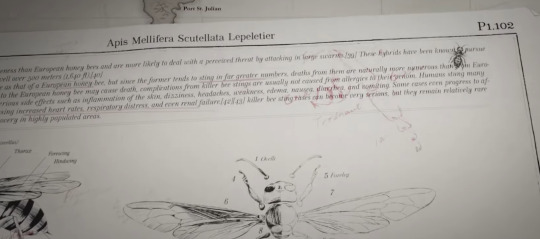
It's possible Orpheus may have done similar to Norton, and maybe that could explain why Norton worked with Orpheus to capture and drug Alice in Orpheus' secret basement. Unless Alice did hallucinate Orpheus as Norton in that 1 basement scene where she's drugged.

If it wasn't a hallucination, that would imply Norton is working for both Orpheus and Vilhelm, unless the request came from Orpheus.
It's clear that Orpheus cares for Alice considering Alice's 1st letter shows he helped her to remember him (Orpheus) and escape from Vilhelm, with him calling her his "Nightingale" at the end of the letter (potentially a hint to Alice maybe being connected to "Miss Nightingale" in the present day). So Orpheus doesn't actually want her dead, but it's possible he might've made the request in order to create a situation where he could act like a hero and save her from death, gaining her trust and potentially helping them to grow closer together.
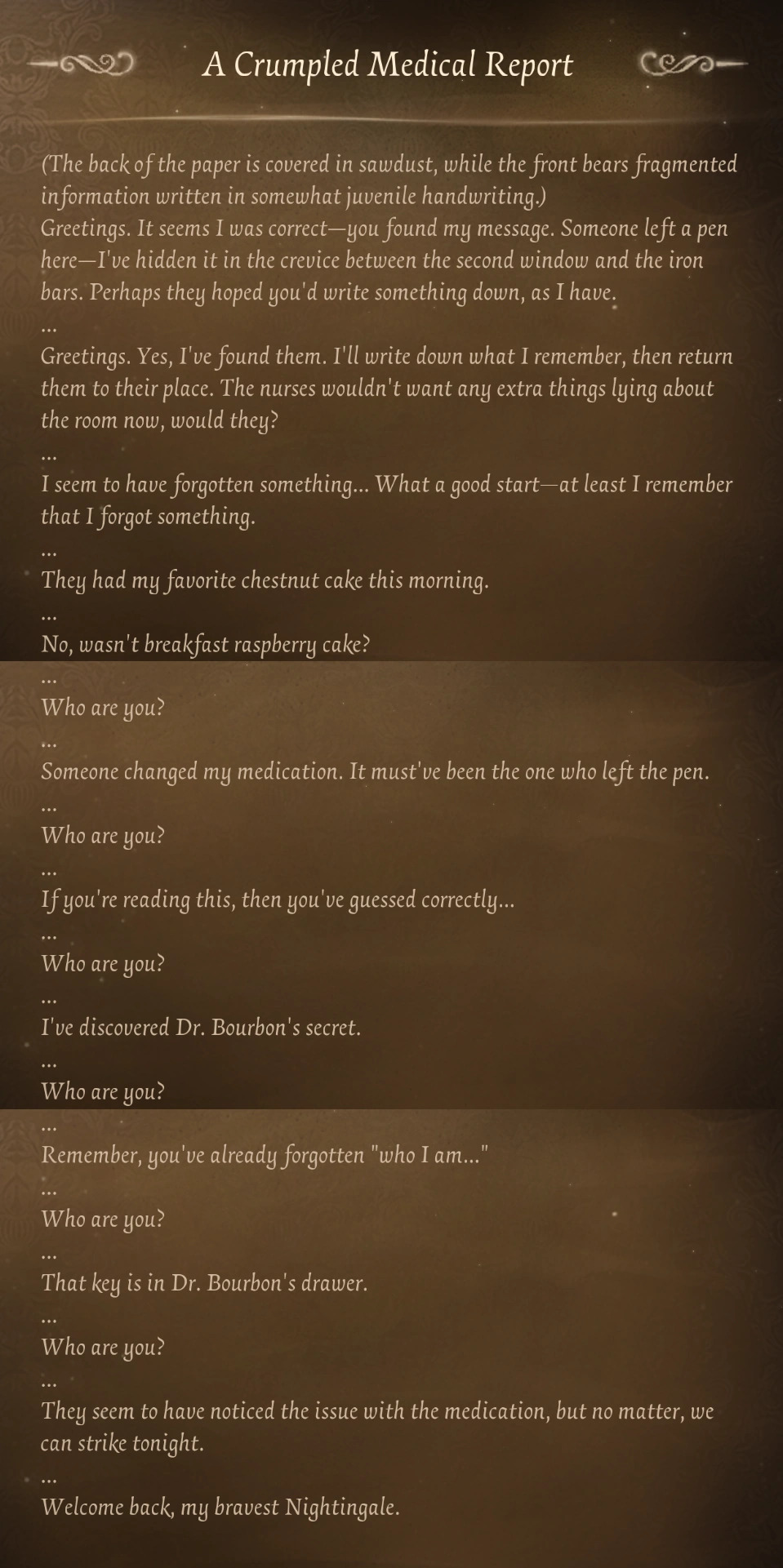
The order would've come from the manor owner (Baron DeRoss), meaning Norton (and everyone) wouldn't know Orpheus is the owner, and thus (if he does actually try to kill her) he would just think someone random (not the person who made the request) was trying to stop him.
Additionally, Orpheus most likely knows Alice is Alice, based on his behavior in Ashes of Memory 1 and 2, expressions, and how he knocks her out and drugs her. It's likely he kept an eye on her the whole time, including her time at White Sand Street Asylum (based on his 1st letter) and her time with Vilhelm in Melbourne, based on Alice's 1st letter and Alice's flashback during Ashes of Memory 2, as well as likely afterwards, after he helps her escape. It's probably just that Alice doesn't know who Orpheus really is (her friend from before the tragedy, or the fact he's the manor owner).
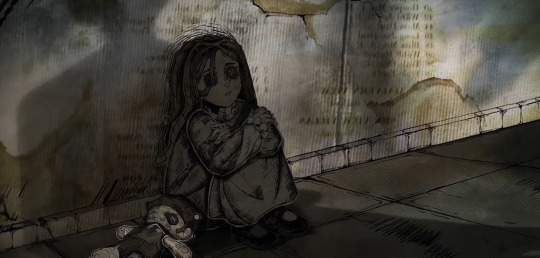

So, if Orpheus doesn't want to kill Alice, but is still trying to use his drugs on her, that may mean his goal has to do with her memories. We've already seen he cares about what she remembers, considering he made sure she remembered him. Maybe his goal then is to change her memories of the tragedy, the most significant and tragic moment of both their pasts. Her backstory even states she "suffered from hysteria" afterwards, while Orpheus' 1st letter states she is "unstable" and even includes the comment "what happened in the past wasn't a great memory to her". Therefore, maybe he wants to change that memory so it's no longer so painful for her. It's possible he may want her to completely forget, but as he didn't want her to forget him, I think it's more likely he wants to change the memory somehow, which could fit in with how the Hydra drug (which "reconstructs" memory) seems to be the drug with the most focus or emphasis (it's the drug Orpheus drinks near the latter part of the Time of Reunion event).
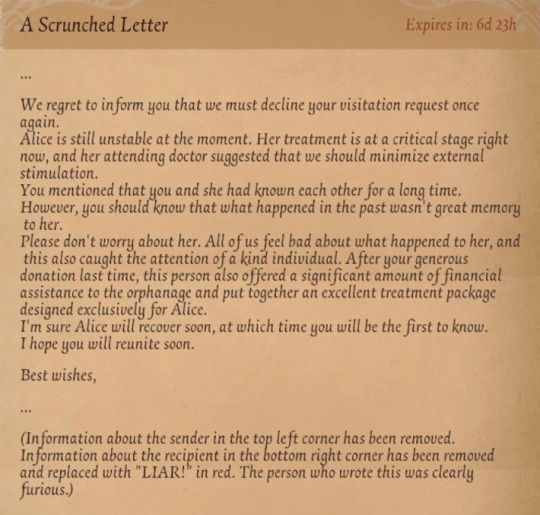
How exactly he wants it to change, I'm not quite sure yet. There is the possibility he wants to at least change her memory of his involvement in it, considering Bonbon's deductions implies he may have helped his real parents take some valuables from the manor. Maybe he also wants to disassociate himself from his real parents, so she doesn't remember it was his own parents that caused the events that led to her parents' deaths. He could do other things as well that would make the memory less painful, maybe even change who she thought her real parents were so she doesn't have to deal with the memory of losing them, who knows. Maybe he wanted to change it so he was the son of the DeRoss couple while she wasn't, so it'd be him in her memories that'd have to deal with their deaths rather than her as much. That could fit with the story he tells her, where he phrases it as he was the kid of the DeRoss couple instead of her. Whatever else, I don't know.
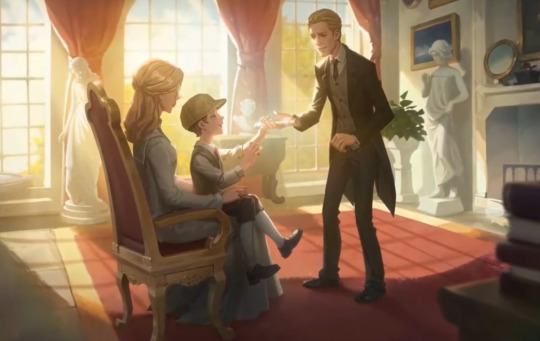
But we know from Alice's trailer that she wants to "face" the truth and whatever other troubles she encounters. She doesn't want Orpheus to be trying to make her avoid the pain by making her forget or changing her memories, nor does she likely agree with his experiments or methods he uses to test his drugs, and thus why she in the end will work to stop him (potentially with the help of Melly and Norton, considering Tracy's game as well as COA 4 emphasize the importance of teamwork to achieve victory).
I still wonder about the specifics regarding what Orpheus' end goal is, but I also wish I knew more about what Vilhelm (and Count Barriere) was trying to do. We know he wanted "goods" from the Mediterranean based on a deal he made with Jose's father, Joaquin Baden. We also know from Evelyn's backstory that he was having her training people like her (in deception, disguises, acting, tricks, good social skills, how to be dangerous, etc...) to work for him like some type of spy organization.
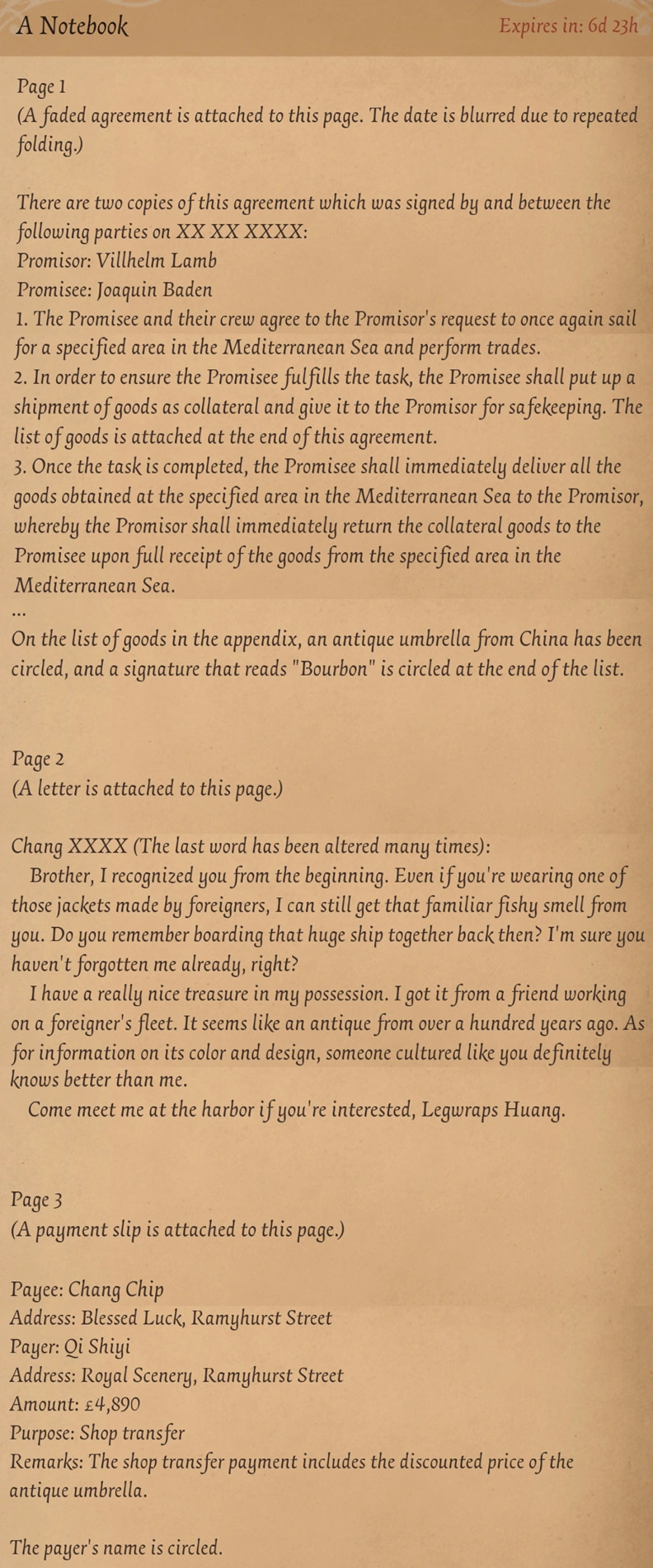
This is likely the same organization from Martha's 4th letter, which is referred to as some type of "unregistered organization" that even an official intelligence agency are unable to investigate with all their manpower and resources. Though it is suggested information on that organization may be "beyond our clearance level", suggesting it is pretty important.
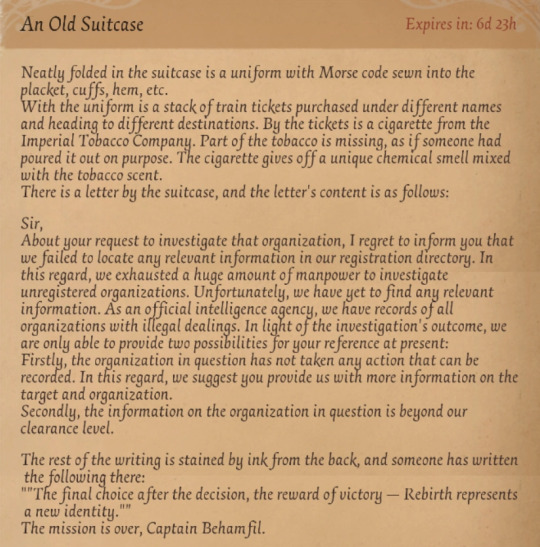
Speaking of Martha, who we know was 1 of the most gifted students Evelyn trained, Martha we know from her 3rd letter is unable or unwilling to be herself. Considering how she was meant to take over for Evelyn, I wonder if this was the type of person Vilhelm wanted Alice to become. We know from her 1st letter she had been forgetting some things, including who Orpheus was. Maybe if Orpheus hadn't saved her sooner, Vilhelm would've been successful.
Maybe the "goods" Vilhelm wanted from the Mediterranean were for his experiments. Maybe it was some of the goods included the "Delphi" plant that we know is used in Orpheus' drugs, as well as Vera's Euphoria. Maybe like Orpheus, Vilhelm wants to mess with people's memories too, maybe to help his organization and to get whatever else it is he wants.
#idv#identity v#Alice DeRoss#journalist#idv alice#identity v alice#idv journalist#identity v journalist#orpheus#novelist#idv orpheus#identity v orpheus#idv novelist#identity v novelist#martha behamfil#coordinator#idv martha#identity v martha#idv coordinator#identity v coordinator#evelyn mora#faro lady#idv evelyn#identity v evelyn#idv faro lady#identity v faro lady#Villhelm Lamb#norton campbell#prospector#idv norton
72 notes
·
View notes
Text
thinking about that episode of totally spies where they go to some made up african country that references liberia in name, which borders on a country vaguely named after kenya, two subsaharan countries on opposite sides of the continent in real life. Anyways they go there on camel through the sahara desert, and in the middle of the desert lies the palace of the queen of Lyrobia (liberia?) and it's just the fcking taj mahal. and everyone in the fucking palace is vaguely middle eastern looking and literally nobody there is black. in africa.
47 notes
·
View notes
Note
Younger Tachihara in the Hunting Dogs not understanding or knowing things because he skipped school and joined a gang instead. Then joined the Hunting Dogs, and stopped going to school all together.
Tachihara having no idea about an array of things. Like, he has zero clue about algebra and geometry. He just kinda knows there's alphabets alongside the numbers in algebra. He knows biology, physics and chemistry, but only what fields of science they are. He gets confused knowing there's math formulas in physics. He also has a little concept about sex education from the streets. He doesn't really remember his geography lessons either. He asks questions like "Is Africa in Asia? Or "Is the US a continent? Or is West the continent?"
And the Hunting Dogs have to continuously remind themselves of the fact he didn't learn those things, and seriously considering sending him to school
Younger Tachihara having the weirdest knowledge he learned from the other HD, but not anything beyond an unfinished middle school education is so fun to me actually.
One of the best spies in Japan, but god forbid he have to sit through classic lit.
He could not tell you what a tendon is, but he knows which how to slice one just right to debilitate an enemy.
At some point, one of them (probably Jouno) convinces Fukuchi to let him go undercover in a school please.
They do, and he comes back with detailed information on his target but has absorbed none of the actual education part.
#bsd#bungo stray dogs#bungou stray dogs#bsd tachihara#tachihara michizou#bsd hunting dogs#hunting dogs
56 notes
·
View notes
Note
*slides you money* I heard you were three seconds from a treatise on David Lange and Mururoa and the Rainbow Warrior?
BY POPULAR DEMAND (ok you and like three other people asked)...
The core fact that you gotta know if you want to talk about New Zealand and nuclear weapons is that campaigning for nuclear disarmament and maintaining a legal nuclear-free zone in our territorial waters has been the core of our independent foreign policy as a country for nearly forty years, since the mid-1980s. This developed over the 60s and 70s from a popular groundswell of anti-nuclear sentiment focused around continued atmospheric nuclear testing in the Pacific by France as well as visits from nuclear-powered (and potentially nuclear-armed) American warships. It evolved into government action; left-wing governments took France to court to demand an end to testing and sent naval frigates to the nuclear test area to protest with Government ministers on board.
This was crystallised in 1985 when a photographer was killed in the state-sponsored terrorist bombing of the Rainbow Warrior, a Greenpeace ship conducting protests at the French nuclear test site of Mururoa. The bombing was carried out by French spies who were decorated when they returned to France (after France promised they would be jailed) and led to a prolonged diplomatic rift between New Zealand and France. The subsequent passing of nuclear-free legislation in 1987, banning nuclear-powered or armed ships visiting our waters, led to New Zealand's suspension from the ANZUS (Australia, New Zealand, and the United States) military alliance.
David Lange, the Prime Minister at the time, opined famously that "The only thing worse than being incinerated by your enemies, is being incinerated by your friends." The ban still has such wide bipartisan support that it's simply not on the table now for even our right-wing parties; infamously, in the early 2000s one Leader of the Opposition told an American congressional delegation that the ban would be 'gone by lunchtime' if he became Prime Minister. This wasn't the DIRECT cause of his eventual toppling but it certainly didn't help. Nobody else has gone near it since.
I am, however, excrutiatingly aware that while our nuclear-free stance is viewed internally by New Zealanders as central to our national identity - there's a well-known song and it was even controversially used this year in a beer ad as a signifier of national pride - nobody else remembers. Particularly the Americans and the French. Seared into my brain is Scott Brown (yes that one) arriving here as the new US Ambassador in 2016 and going on the radio to talk earnestly about how Kiwis didn't realise that nuclear fallout wasn't restricted by national borders, c.f. North Korea, as if anti-nuclear campaigning wasn't...well...see all of the above. READ YOUR GODDAMN BRIEFING PACKETS ON THE PLANE, SCOTT, IT'S A FOURTEEN-HOUR FLIGHT.
So what does that mean for the Locked Tomb books?
As the linked article about the beer ad notes, anti-nuclear protesting has been a site not only of national identity formation but specifically Indigenous protest in the Pacific. It is Pasifika peoples who have borne the brunt of nuclear testing and much of the early anti-nuclear movement in Aotearoa was led by Māori and Pasifika, and closely tied to the anti-apartheid movement which focused on the removal or restriction of Māori and Pasifika rugby players on tours to apartheid South Africa.
In Nona the Ninth, it becomes clear that John (a Māori man) and G- (whose ethnicity is not specified but 'reads' as most likely Māori or Pasifika in context), as well as their friends, blackmailed the US government for a suitcase nuke and eventually used it to bomb Melbourne, with John then causing nuclear armageddon around the world. This is, uh, emphatically not the same thing as "Twitch streamers [John & co] nuking New Zealand", as chill as I generally am with the eliding of detail for joke posts. This is a Māori man from and in New Zealand nuking first Australia and then the rest of the world.
This is, obviously, if you're coming from the historical context, hugely transgressive in a way I can only describe as a...horror of agency? The horror of saying, what if we were willing to do the thing that we identify ourselves as a nation as being against under all circumstances? What if instead of standing nobly against nuclear weapons, for reasons of moral indefensibility, we were the ones to pull the trigger? What if our culture and our people survived the apocalypse because one of us started it, instead of us surviving by virtue of being so small, so on the edge of the world, so carelessly left off world maps?
And as to why it matters that it's Melbourne - New Zealand has a...complicated relationship with Australia that's hard to directly parallel to anywhere else (it's sort of like Canada and the US but also not like Canada and the US in any way that Canadians or Americans ever interpret that statement in my experience). In particular, there is huge anxiety in Australia about New Zealand as a source of non-white (and specifically Māori and Pasifika) emigration to Australia. Australian immigration policy, while technically retaining free movement between the two nations, has grown more and more restrictive over the last twenty years. Right now the central point of conflict is a policy of deporting mostly Māori and Pasifika New Zealand-born prisoners back to New Zealand on completion of their sentences, regardless of how old they were when they came to Australia, resulting in a large body of traumatised people with zero community ties being dumped back here and - no surprises! - frequently turning to crime. There's A Lot Going On There. Added to which the Christchurch mosque shooter deliberately travelled here from Australia to carry out his terrorism. And yet also, hundreds of thousands of us live there and many more have relatives and friends there.
And Melbourne? Melbourne is like....the cool Australian city, if you're a New Zealander. Sydney is too big (the same population as our whole country!) and too...everything, Brisbane and the Gold Coast are tropical and so kinda weird, Adelaide and Perth? we don't know them, but Melbourne is aspirational. Melbourne is the kind of city Wellington and Auckland would like to be when they grow up, maybe. They have laneways and culture and a working tram system. But it's also a very...white kind of cool. The kind enjoyed by rich Pākehā who can afford to go on weekend shopping holidays there.
So yeah. John and G- and the crew nuke Melbourne and it's a nexus of all these tensions old and new, of who we think we are as people and as a nation, of how we relate to Australia which is our friend and nearest neighbour and our rival and our scapegoat (because they're the really racist ones, aren't they? If we say that loud enough, does it drown out the sounds of our own sins?)
It's a fantasy of power and a horror of it at the same time. I hope someone right now is writing a monograph on this, there's so much to dig into. But it deserves to be framed as what it is, as a response from a Kiwi author to our own history and identity. It deserves to be understood in context.
828 notes
·
View notes
Text
some book recommendations to understand and know more about congo :
Lumumba : Africa's Lost Leader by Leo Zeilig

Spies in the Congo : The race for the ore that built the atomic bomb by Susan Williams

White Malice : The CIA and the neocolonisation of Africa by Susan Williams

The Congo from Leopold to Kabila by George Nzongola- Ntalaja

please add more!
#congo#congo thread#drc#democratic republic of the congo#congo genocide#books#book recommendations#genocide#usa#the congo#history#current events#current news#the drc
29 notes
·
View notes
Text
The Congo’s role in creating the bombs dropped on Hiroshima and Nagasaki was kept secret for decades, but the legacy of its involvement is still being felt today.
“The word Shinkolobwe fills me with grief and sorrow,” says Susan Williams, a historian at the UK Institute of Commonwealth Studies. “It’s not a happy word, it’s one I associate with terrible grief and suffering.”
Few people know what, or even where, Shinkolobwe is. But this small mine in the southern province of Katanga, in the Democratic Republic of the Congo (DRC), played a part in one of the most violent and devastating events in history.
More than 7,500 miles away, on 6 August, bells will toll across Hiroshima, Japan, to mark 75 years since the atomic bomb fell on the city. Dignitaries and survivors will gather to remember those who died in the blast and resulting radioactive fallout. Thousands of lanterns carrying messages of peace will be set afloat on the Motoyasu River. Three days later, similar commemorations will be held in Nagasaki.
No such ceremony will take place in the DRC. Yet both nations are inextricably linked by the atomic bomb, the effects of which are still being felt to this day.
The Shinkolobwe mine – named after a kind of boiled apple that would leave a burn if squeezed – was the source for nearly all of the uranium used in the Manhattan Project, culminating with the construction of the atomic bombs dropped on Japan in 1945.
But the story of the mine didn’t end with the bombs. Its contribution to the Little Boy and Fat Man has shaped the DRC’s ruinous political history and civil wars over the decades that followed. Even today the mine’s legacy can still be seen in the health of the communities who live near it.
“It’s an ongoing tragedy,” says Williams, who has examined the role of Shinkolobwe in her book Spies in the Congo. She believes there needs to be greater recognition of how the exploitation and desire to control the mine’s contents by Western powers played a role in the country’s troubles.
Mombilo too is campaigning to raise awareness of the role played by the Congo in deciding the outcome of World War Two, as well as the burden it still carries because of this. In 2016, the CCSSA’s Missing Link forum brought together activists, historians, analysts, and children of those affected by the atomic bomb, both from Japan and from the DR Congo. “We are planning to bring back the history of Shinkolobwe, so we can make the world know,” says Mombilo.
Out of Africa
The story of Shinkolobwe began when a rich seam of uranium was discovered there in 1915, while the Congo was under colonial rule by Belgium. There was little demand for uranium back then: its mineral form is known as pitchblende, from a German phrase describing it as a worthless rock. Instead, the land was mined by the Belgian company Union Minière for its traces of radium, a valuable element that had been recently isolated by Marie and Pierre Curie.
In no other mine could you see a purer concentration of uranium. Nothing like it has ever been found – Tom Zoellner
It was only when nuclear fission was discovered in 1938 that the potential of uranium became apparent. After hearing about the discovery, Albert Einstein immediately wrote to US president Franklin D Roosevelt, advising him that the element could be used to generate a colossal amount of energy – even to construct powerful bombs. In 1942, US military strategists decided to buy as much uranium as they could to pursue what became known as the Manhattan Project. And while mines existed in Colorado and Canada, nowhere in the world had as much uranium as the Congo.
“The geology of Shinkolobwe is described as a freak of nature,” says Tom Zoellner, who visited Shinkolobwe in the course of writing Uranium – War, Energy, and the Rock that Shaped the World. “In no other mine could you see a purer concentration of uranium. Nothing like it has ever been found.”
In a deal with Union Minière – negotiated by the British, who owned a 30% interest in the company – the US secured 1,200 tonnes of Congolese uranium, which was stockpiled on Staten Island, US, and an additional 3,000 tonnes that was stored above ground at the mine in Shinkolobwe. But it was not enough. US Army engineers were dispatched to drain the mine, which had fallen into disuse, and bring it back into production.
Under Belgian rule, Congolese workers toiled day and night in the open pit, sending hundreds of tonnes of uranium ore to the US every month. “Shinkolobwe decided who would be the next leader of the world,” says Mombilo. “Everything started there.”
All of this was carried out under a blanket of secrecy, so as not to alert Axis powers about the existence of the Manhattan Project. Shinkolobwe was erased from maps, and spies sent to the region to sow deliberate disinformation about what was taking place there. Uranium was referred to as “gems”, or simply “raw material”. The word Shinkolobwe was never to be uttered.
This secrecy was maintained long after the end of the war. “Efforts were made to give the message that the uranium came from Canada, as a way of deflecting attention away from the Congo,” says Williams. The effort was so thorough, she says, that the belief the atomic bombs were built with Canadian uranium persists to this day. Although some of the uranium came from Bear Lake in Canada – about 907 tonnes (1,000 tons) are thought to have been supplied by the Eldorado mining company – and a mine in Colorado, the majority came from the Congo. Some of the uranium from the Congo was also refined in Canada before being shipped to the US.
Western powers wanted to ensure that any government presiding over Shinkolobwe remained friendly to their interests
After the war, however, Shinkolobwe emerged as a proxy ground in the Cold War. Improved enrichment techniques made Western powers less dependent on the uranium at Shinkolobwe. But in order to curtail other nations’ nuclear ambitions, the mine had to be controlled. “Even though the US did not need the uranium at Shinkolobwe, it didn’t want the Soviet Union to get access to the mine,” explains Williams.
When the Congo gained independence from Belgium in 1960, the mine was closed and the entrance filled with concrete. But Western powers wanted to ensure that any government presiding over Shinkolobwe remained friendly to their interests.
So important was stopping the Communist threat, says Zoellner, that these powers were willing to help depose the democratically elected government of Patrice Lumumba and install the dictator Mobutu Sese Seko in 1965 for a decades-long reign of ruinous plutocracy.
Attempts by the Congolese people to negotiate better conditions for themselves were attacked as Communist-fuelled sedition. “The idealism, hope, and vision of the Congolese for a Congo free of occupation by an external power was devastated by the military and political interests of the Western powers,” says Williams.
A wound unhealed
Mobutu was eventually toppled in 1997, but the spectre of Shinkolobwe continues to haunt the DRC. Drawn by rich deposits of copper and cobalt, Congolese miners began digging informally at the site, working around the sealed mineshafts. By the end of the century, an estimated 15,000 miners and their families were present at Shinkolobwe, operating clandestine pits with no protection against the radioactive ore.
Accidents were commonplace: in 2004, eight miners were killed and more than a dozen injured when a passage collapsed. Fears that uranium was being smuggled from the site to terrorist groups or hostile states vexed Western nations, leading the Congolese army to raze the miners’ village that same year.
Stories abound of children born in the area with physical deformations, but few if any medical records are kept
Despite the mineral wealth present at Shinkolobwe, since Union Minière withdrew in the early 1960s there has never been an industrial mine that could safely and efficiently extract the ores and return the proceeds to the Congolese people. After the Fukushima nuclear accident in 2011, any interest in extracting the uranium for civilian use withered away. “Uranium, even in its natural condition, resists control,” says Zoellner. “Right now Shinkolobwe exists in a limbo, a symbol for the inherent geopolitical instability of uranium.”
The ongoing secrecy around Shinkolobwe (many official US, British and Belgian records on the subject are still classified) has stymied efforts to recognise the Congolese contribution to the Allied victory, as well as hampering investigation into the environmental and health impacts of the mine.
“The effects are medical, political, economic, so many things,” says Mombilo. “We’re not able to know the negative effects of radiation because of this secrecy.” Stories abound of children born in the area with physical deformations, but few if any medical records are kept. “I had a witness who died with his brain coming out of his head, because of the radiation,” says Mombilo. “In all these years, there is not even a special hospital, there is no scientific study or treatment.”
Many of those affected by Shinkolobwe are now campaigning for recognition and reparation, but knowing who should receive them – and who should pay – is compounded by the lack of information made available about the mine and what took place there.
“Shinkolobwe is a curse on the Congo,” says Mombilo.
But he adds that for over a century, the country’s rich resources have made possible one global revolution after another: rubber for tyres made automobiles possible, uranium fuelled nuclear reactors, coltan built the computers of the information age, and cobalt powers the batteries of mobile phones and electric vehicles.
“Our world is moved by the minerals of the Congo,” says Mombilo. “The positive thing I can say is that in all these advanced technologies, you’re talking about the Congo.”
The Congo’s impact on the world has been immeasurable. Recognising the name Shinkolobwe alongside Hiroshima and Nagasaki should be the first step to repaying that debt. {read}
#article#BBC#history#war crimes#atomic bomb#congo#world war 2#world war ii#colonialism#colonization#us imperialism#mining#Hiroshima
15 notes
·
View notes
Note
On why South Africa has been jumping in to this so enthusiastically: I can't remember where I read it, but I feel like I saw some articles right around when SA brought charges to the ICJ that pointed out that at least part of the reason why the ruling ANC party was doing this was to distract from the many, many crises happening in the country due to their incompetence and corruption, and the hope that fighting against the perfidy of Israel would rally voters back to the ANC in upcoming elections, but that it could quite possibly backfire due to a sizable amount of South Africa's population being socially conservative African Christians who tend to have a similar view of Israel as American evangelicals (a big Christian denomination in SA is actually called the Zionist church, although it's unrelated to the kind of Zionism the founded Israel and is apparently named after the town of Zion, Illinois where the founder of the movement came from). I don't know enough about South African politics to know if this is actually true, but it would be funny if it did end up leading to the ANC losing power
I would love it if that were true, but don't have the heart to look it up either way. You are definitely right that South Africa, basket-case of a failing state that it is, wants to distract its domestic victims from its domestic failures with some agitprop about Israel. Their current president Ramaphosa has made clear that he considers South African Jews to be Israeli spies.
EDIT: flashback to the time when major South African cities were completely running out of water rather than accept help from Israel. The suicide-bomber mentality is a social contagion.
15 notes
·
View notes
Text

Frank Frazetta's splash page for the first issue of Thun'da, King of the Congo (1952).
Thun'da started off with a great, if not quite completely original premise: a modern man (Roger Drum)finds himself trapped in a lost land populated by prehistoric beasts and strange races of men. In the course of the first issue, Drum learns not only how to survive, but becomes the mightiest warrior in the land, the warrior known as Thun'da!
Thun'da becomes ruler of the land, gains a shapely girl friend named Pha, and even gets a pet saber-toothed tiger named.....(wait for it)....Sabre. But also in the course of that first issue the three of them get stranded outside the lost land when earthquakes seal it off. They take up residence in the Congo region of Africa, where Thun'da just becomes another Tarzan-wannabe, albeit with a pet saber-toothed tiger.
Sadly, Frazetta only provided the artwork for the first issue. The remaining five in the series had artwork by Bob Powell who, let's face it, was no Frazetta.
And the stories became generic yarns that you could find in any jungle-themed comic book on the stands. Instead of battling dinosaurs, beast men, giant snakes, and ape-men riding mammoths, Thun'da battled Russian spies, hostile tribes, slavers, hostile Arabs, ivory thieves, and a bunch of garden variety crooks.
On the other hand, the comic was the basis for the 1952 movie serial King of the Congo, starring Buster Crabbe as Thun'da (spelled Thunda). It had the distinction of being Crabbe's last serial role, as well as the last Tarzan-like serial made.
#Thun'da King of the Congo#Thun'da#Frank Frazetta#Magazine Enterprises#Golden Age comics#Atomic Age comics
13 notes
·
View notes
Text
Over the last 10 months, the world’s attention has been focused on Israel and the Gaza Strip. The war that began on Oct. 7, 2023, with Hamas’s attack on Israel has been cataclysmic. But the conflict has overshadowed another crisis enveloping the region: intense heat and water scarcity.
In mid-July, the heat index in Dubai was 144 degrees Fahrenheit. In late June, the Grand Mosque in Mecca, Saudi Arabia, registered a temperature of 125 degrees. This heat coincided with Hajj season. When it was over, more than 1,300 people had lost their lives. And in Egypt, temperatures have rarely fallen below 100 degrees since May.
It was actually hotter in the Gulf region last summer, topping out at an eye-popping real feel of 158 degrees in the coastal areas of Iran and the United Arab Emirates. That reading and the unrelenting heat this season exceeded the “wet-bulb temperature” at which humans, if exposed for six hours, can no longer cool themselves off, leading to heat-related illnesses and death.
The World Bank estimates that by 2050, water scarcity will result in GDP reductions of up to 14 percent in the region. In 2021, a UNICEF report stated that Egypt could run out of water by 2025, with the Nile River coming under particular stress. Water stress in countries such as Egypt is exacerbated by the upriver flow of the Nile being restricted because of the construction of the Grand Ethiopian Renaissance Dam. Syria and Turkey have been at odds over many years because the Turks have built dams along the Tigris and Euphrates rivers, cutting the flow south. And among the many issue that divide Israelis and Palestinians is water and who has the right to tap into the Mountain Aquifer of the West Bank.
In addition to the extreme heat’s significant threat to life and livelihood in the Middle East and North Africa, a hotter region has the potential to destabilize politics well beyond its borders.
Before going further, it is important to underscore that this is not a column about “climate conflict.” About a decade ago, there was a spate of articles on this issue, highlighting the Syrian Civil War as an example of what the future would look like as the globe warmed. Even though this idea captured the imagination of a variety of notables including then-Prince Charles, U.S. Sen. Bernie Sanders, and others, the claim about Syria in particular was based on incomplete data, faulty interpretation of that data, over-generalization, and, as a result, erroneous conclusions.
As the October 2021 National Intelligence Estimate on climate change dryly noted, the U.S. intelligence community had “low to moderate confidence in how physical climate impacts will affect US national security interests and the nature of geopolitical conflict, given the complex dimensions of human and state decisionmaking.” Basically, the spies are saying it is hard to make a causal connection between climate and conflict because there are so many variables that contribute to conflict.
A clearer and more pressing problem is how people adapt to rising temperatures and water scarcity. They migrate to places with lower temperatures and more water. According to the World Bank, as many as 19 million people—approximately 9 percent of the local population—will become displaced in North Africa by 2050 because of the climate crisis. And for people in the region, the destination of choice is Europe.
A number of caveats are in order: First, the bank is extrapolating. It is possible that there may be political, economic, or technological changes that limit the number of migrants. Second, not every person on the move will be migrating because of the changing climate. And finally, some of those displaced people will remain somewhere in the region given the resources necessary to make it across the Mediterranean. (That presents its own set of problems, however. Internally displaced people, who generally settle in urban areas, will put pressure on the budgets and infrastructure of places whose resources and capacity to absorb migrants are limited.)
All this said, in the abstract migration is positive for countries in the European Union, which have aging populations and need workers to pay into generous social safety nets. Yet the claim that migration provides benefits to society remains unconvincing to a significant number of Europeans who oppose large (or perceptively large) numbers of newcomers into their countries.
France’s National Front party, which long flirted with fascism and a coy version of Holocaust denial and rebranded itself as the National Rally in 2018 in an effort to shed this ugly legacy, has become a major force in French politics in large part due to its opposition to immigration, especially from Islamic countries. Hungary’s Prime Minister Viktor Orban, the avatar of European illiberalism, built his authoritarian system on fears of the threat that migrants pose to Hungarian society.
Brexit, which British voters approved in 2016, was about a lot of things, but immigration propelled the United Kingdom’s imprudent decision to leave the European Union. More recently, the proximate cause of the recent riots in England was the allegation that an immigrant was responsible for the murder of three young girls at a dance class in the seaside town of Southport. Despite the allegation being demonstrably false, the ensuing street violence suggests that simmering resentment toward migrants within a segment of the marginalized English working class stoked by, and combined with, right-wing populism is dangerous and potentially destabilizing.
Then there is Germany, where in 2015 hundreds of thousands of Syrians sought refuge from the violence enveloping their country. Then-German Chancellor Angela Merkel made the decision to grant Syrians entry. It was a decision that many Germans embraced, but it also produced a backlash that has helped drive the emergence of the Alternative for Deutschland (AfD) party. The AfD is different from other right-wing populist parties in Europe given its provenance. Although it began as a party based on Euro-skepticism, it has moved steadily toward embracing fascism, downplaying the atrocities of the Third Reich, spreading Islamophobia, and inveighing against foreigners in general. Of course, there is a whole host of reasons for the rise of the AfD and other fascist, illiberal, right-wing populist parties in Europe. But scholars agree that migration is the through line in this phenomenon.
The Unites States has a compelling interest in a Europe that is stable, whole, free, and prosperous. The emergence and success of xenophobic, fascist, or fascist-adjacent parties that make common cause with the enemies of Western liberalism are a threat to that core U.S. interest. That’s why Washington needs to help head off mass migration to Europe. There is not a lot that the United States can do about conflicts—such as the one in Sudan—that drive migration, but U.S. policymakers can help when it comes to the climate crisis, which will contribute to the increasing numbers of people seeking refuge in Europe.
This requires not increasing financial assistance or green infrastructure projects but something both more cost-effective and influential: creative diplomacy. High heat makes the problem of water scarcity worse, which is why people migrate. Using its own experience and technical expertise from managing resources in the increasingly hot western United States, the U.S government can play a useful role in helping countries in the Middle East do a better job managing what water they have.
The conflicts that span the region make assistance harder, given the fact that water sources often cross boundaries. But that is a challenge that can be overcome. Not only are there technical solutions to the problem of water scarcity, but there are also political incentives to come to agreement even across conflict zones.
Leaders across the region may disdain their citizens, but they have a political interest in satisfying at least their people’s minimum demands, including access to water. Even with all the nationalist huffing and puffing of their governments, Egyptian President Abdel Fattah al-Sisi and Ethiopian Prime Minister Abiy Ahmed have a strong interest in sharing the waters of the Nile. Without such an agreement, the political and economic problems of both countries will deepen, threatening both leaders.
Of all things, the maritime border agreement between Israel and Lebanon can be a template of sorts for the way U.S. officials approach the problem of water sharing in the region. There was a range of critics of the agreement in the United States, Israel, and Lebanon, but the actual substance is less important than the way U.S. diplomats brought it about. They separated Israeli concerns about Lebanon and Lebanese concerns about Israel and focused instead on the upside for each country. Once that became clear—the exploitation of gas deposits off the Israeli and Lebanese coasts—it was hard for the two countries that nonetheless remain in a state of war to not agree to a boundary. Despite 10 months of conflict between Israel and Hezbollah, the agreement has not been breached. That is important and suggests a way forward for negotiations over water.
It is tempting to want to place efforts to deal with water scarcity in some broader climate agenda for the Middle East. That is exactly what U.S. officials should not do. Washington should focus on issues where it has a realistic chance of making a difference. There is little the United States can do about the intense heat, and mitigation of greenhouse gases is not a pressing problem in the region because it does not actually emit that much greenhouse gas. Water, however, is critically important, and it is an area where the United States has expertise to bring to bear.
Indeed, helping strike agreements to manage water scarcity in the Middle East is a low-cost way the United States can mitigate the perversions of European politics and help shape the global order to come.
9 notes
·
View notes
Note
Why aren’t there seemingly any Krakoa era-esque stories based in Wakanda, where the creator goes deep on the world-building for the nation and it’s relationship with the wider Marvel universe? Correct me if I’m wrong, but it seems like most Black Panther books are basically always just “who is T’Challa if he isn’t King” or “why T’Challa is the worst” type stories. They’re boring and uninspired, give me my nerdy shit Marvel!!!
I think you've missed some key issues, because there's definitely been some that cover world-building about Wakanda's relationship with Krakoa.

From the beginning of HOXPOX, Hickman established that Wakanda had a unique relationship with Krakoa - while most human nations signed trade deals with the mutant nation-state, some did not due to ideological or geostrategic opposition. Alone in the world, Wakanda (and its protectorates in east Africa) didn't sign a trade deal with Krakoa because it was so technologically advanced that it simply didn't need anything Krakoa was selling.
This was a source of consternation for the Krakoan government, so they went to some lengths to try to bring Wakanda into their diplomatic-economic orbit - as we see in X-Men #4. These efforts were politely rejected, as the Wakandans preferred a more arms-length relationship in which Krakoan-Wakandan relations would be managed through bilateral monarchical negotiations between T'challa and Ororo Monroe, leveraging their personal connections to promote a friendly policy of non-interference.
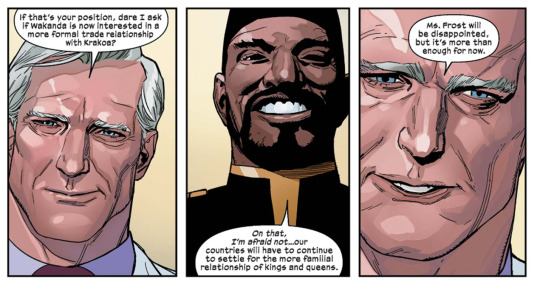
This status quo broke down during the Arraki-Amenthi invasion of Otherworld, which threatened the very existence of Krakoa and indeed the survival of the whole world. As part of Saturnyne's scheme to foil the invasion through a tournament of sword-bearers, Storm was tasked with retrieving the Wakandan blade Skybreaker. This vibranium weapon was uniquely suited to Storm's powers, amplifying her omega weather control powers even further, but it was also sacred to Wakanda as it was also the weapon forged by the founder of their nation and the Black Panther cult.

Thus, when Ororo traveled to Wakanda to ask for the sword in Marauders #13, T'challa did not want to give it to her - but rather than refuse her outright, he attempted to stall negotiations and avoid the confrontation. With a literal deadline for Krakoa, Otherworld, and Earth itself breathing down her neck, Storm was unwilling to wait and broke into the royal vaults to steal Skybreaker. While T'challa ultimately let Ororo leave with the weapon, trust between the two of them and their respective nations was broken - and Wakanda cut ties with Krakoa, although it never declared formal enmity with the mutant nation.
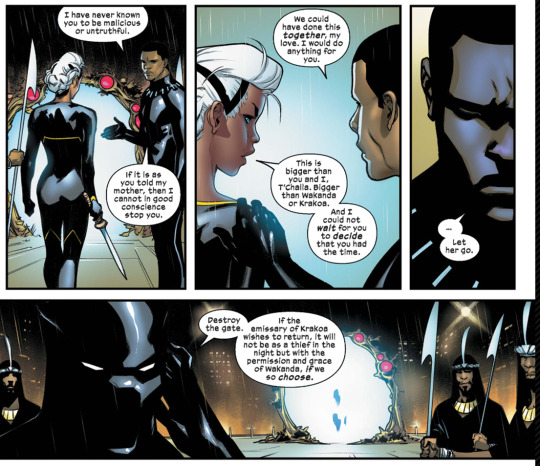
At the same time, neither country could totally isolate themselves from the other - especially after Krakoa terraformed Mars at the first Hellfire Gala and turned it into a new homeland for Arrako and her people. Through the joint efforts of S.W.O.R.D and Storm, Arrako would become the diplomatic nexus for intergalatic politics and Krakoa the new foundation of intergalactic monetary policy - something that had enormous ramifications for the Intergalatic Empire of Wakanda.
This ushered in something of a cold war between the two nations, who had to maintain formal diplomatic and economic channels, but who secretly engaged in espionage against the other in order to gain intelligence as to what their counterparts were up to, since they no longer trusted the other to give them an honest answer directly. This caused a great deal of tension for Wakandan citizens who were mutants, as they became the obvious candidates to spy on Krakoa and Arrako for Wakanda.
As depicted in Black Panther #3 and X-Men Red #4, the former X-Man Nezhno Abidemi, aka Gentle, was recruited by T'challa to be one of his sleeper agents. Using the very real anti-mutant prejudice Abidemi experienced growing up in Wakanda as cover, Gentle spied on Ororo Monroe in her capacity as the new Regent of Arrako and Voice of Sol on behalf of the Intergalactic Empire of Wakanda.

Because Storm isn't an idiot, she quickly uncovered Gentle as an agent, but left him in place as a backchannel between their two countries, although the deception further strained the personal ties between her and T'challa. As both of them are professionals, this didn't stop Arrako and Wakanda collaborating diplomatically to forestall a Shi'ar civil war.
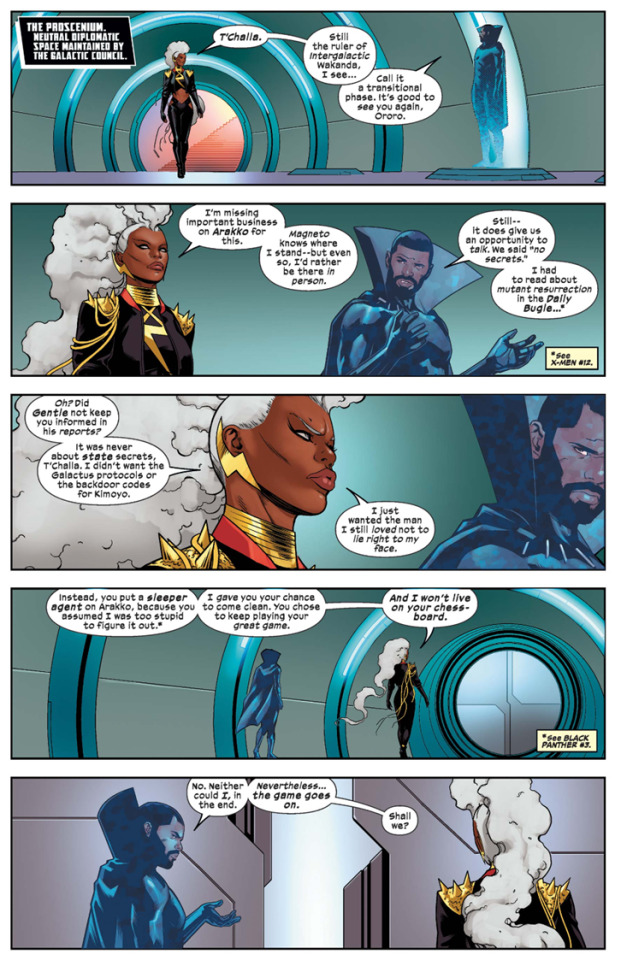
When Krakoa fell, ORCHIS attempted to take advantage of the situation and Wakanda's presumed anti-mutant sympathies. In Wolverine #39, we see that the ORCHIS operative Jun Wei was dispatched to Wakanda to work out a Vibranium-for-Sentinels agreement. When Prime Minister Folasade rejected the offer, Jun Wei turned to the criminal gangs of Birnin T'chaka to get ORCHIS' hands on rare earth metals - only to be foiled by the joint efforts of Logan and T'challa.
#xmen#xmen meta#marvel#marvel meta#krakoa#wakanda#black panther#storm#t'challa#ororo monroe#gentle#nezhno abidemi
30 notes
·
View notes
Text
Midnight Madness- Part One

read part two here
summary: with New Years fast approaching, Penny needs a band to play at the Hard Deck and Bob might just be able to help with that.
pairing: robert ‘bob’ floyd X female musician!reader
warnings: swearing, teasing, slight angst/reminiscing, bean picks the shittiest band name known to man
words: 2.3k
a/n: delayed new years fic for you all, enjoy part one! hoping to have part two out very soon. As always, feedback is very much appreciated
tag list: @call-sign-jinx @shrimping-for-all @ateliefloresdaprimavera
✨add yourself to my taglist(s) here✨
When Mav calls an urgent meeting, it’s pretty much an unspoken rule: drop what you’re doing and go. Which is why, when Bob receives a text message from the man himself in the uranium mission group chat one afternoon right before New Year’s, he makes his way to the Hard Deck, no questions asked.
He’s not the first to arrive; Hangman, Payback and Coyote are stood talking in the corner, their workout clothes suggesting they have just come from the gym. He nods at them in greeting and makes his way into the bar, closing the door behind him. Scanning the room, he visibly relaxes when he spies Phoenix sat on her own looking unimpressed and scrolling on her phone. Bob makes a beeline for the table and his front seater looks up with a smile when he pulls a chair out to sit down.
“Do you have any idea what this is about?” Bob asks
Phoenix shrugs. “I have no idea, Mav isn’t even here yet.”
“Urgent my ass.” The bespectacled lieutenant mutters in reply, causing Phoenix to chuckle. Bob leans back against his chair, nervously pulling on the cap that covers his head. A few minutes later, Mav walks into the Hard Deck with Rooster in tow, causing all the pilots in attendance to sit up a little straighter. Fanboy slips in just after them and slides into the seat next to Bob. Rooster perches on a stool next to the bar whilst Mav stands in the middle of the room.
“Listen up. Penny has a problem which means I now have a problem.” Eyebrows raise in intrigue around the room as Mav addresses them. “And because I cannot solve that problem, I am making it your problem.” Bob catches Phoenix’s gaze as she rolls her eyes at Mav’s familiar words.
Rooster is the first to speak up, “Hey Mav, this isn’t gonna be like when we had to find that cactus for Penny’s birthday last month, right?” Bob nearly groans at the thought. The team had searched for a good couple of weeks for a rare cactus found only in very specific regions of Northern Africa. It turns out Amelia had told Mav that Penny wanted this impossible to find cactus purely to mess with him. None of the pilots had been impressed at all, particularly Coyote who had spent upwards of an hour on the phone with a Libyan cactus farmer.
A chorus of groans sound at Roosters question, with most of the pilots in the room standing or getting ready to leave. Mav cringes slightly at the outburst. “Guys, guys just wait a minute. I promise this time it actually came from Penny and not Amelia.”
“Well then what’s the problem? ‘Cause I don’t know about you guys but I’ve got things to do.” This comes from Hangman, causing Phoenix to let out a scoff. “I’m sure whatever mirror is calling your name can wait Bagman, let’s just hear what Mav has to say.”
The short captain sends a grateful look towards Phoenix and he continues. “The band who’s supposed to play here on New Years just cancelled last minute so your job is to find a replacement.”
Cue more groans from the pilots
“A replacement?”
“But Mav, New Years is two days away!”
“There’s no way we can pull that off.”
Everyone continues yelling and complaining until Rooster whistles loudly, cutting through all the noise. “Say we can do this?” Mav nods, motioning for his godson to continue. “What do we get in return?”
“The person or people that get someone lined up for New Years drink free that night.”
“All night?” Payback asks
“All night.” Mav confirms.
That sets off a chain reaction of everyone planning how to find a band for Penny. Most take out their phones and start frantically searching whilst others, namely Fanboy, try to set up a team in order to have more of a chance of winning those free drinks.
Phoenix goes to pull out her phone to start searching but then catches Bob’s eye who is smiling softly to himself. He looks up at her and gives her a quick nod then motions for her to follow him outside. She obliges, and the pair slip out unnoticed by the rest of the group who are still frantically squabbling over how to find the best band on such short notice.
“Okay what gives?” Phoenix asks when they’re out of earshot.
“We’re in this together right?” Bob confirms.
Phoenix nods excitedly. “Of course we are! Now come on, talk to me Bob. Do you know a band?”
“Yeah. I mean I might. A friend of mine fronts it. I can call and ask if they don’t have anything booked for New Years?”
“Do it!” Bob chuckles slightly at Phoenix’s elated state and pulls out his phone to call you.
He’s just typing in his passcode when Phoenix adds “and maybe you can actually ask that barista that keeps giving you free coffee to be your date,” Bob rolls his eyes at his friends antics. In the short time he’s known Phoenix, she’s become like a sister to him but with that sisterly relationship comes the inevitable desire for him to be happy. This desire manifests itself in the encouragement of Bob to find someone to settle down with, even if it is just a barista who insisted his coffee was on the house; Bob left a $5 bill on the counter on his way out anyway.
Bob just shakes his head and ignores Phoenix’s words, focusing on finding your number in his contacts.
-
Admittedly, Bob’s proposal for you to play at the Hard Deck on New Years is rather stuttered due to the stare from his front seater practically burning holes into the side of his head for the duration of the call. He wasn’t really expecting you to answer the phone as quickly as you did which further increases his anxiety whilst talking to you, the glare from next to him only heightening his discomfort. Phoenix’s harsh gaze is only broken upon the confirmation that Bob has secured the band for the whole night.
It turns out, by some form of sheer irony or dumb luck, the venue in LA your band were going to play at had been shut down by the health department two days earlier and couldn’t be opened again until the second week in January, meaning you had a band that were itching to play and were more than happy to take the open slot at the Hard Deck when Bob asked.
“So come on, show me this band then.” Bob sighs, having just put his phone back in his pocket.
Inching closer to the screen, Phoenix plucks Bob’s phone out of his hands and pauses the video before looking up wide-eyed at her back seater. “No. Freaking. Way!”
“What?”
“That’s Bad Decisions, right?”
“Uh huh, you know ‘em?” Bob asks, surprised that Phoenix has heard of the band.
She nods in reply, “Fanboy and I have been obsessing over them for like the last year! How did I not know that you know the lead singer?”
“I thought I told you I was in a band in high schoolI?” Bob’s almost certain he did, recalling how it took him showing his front seater evidence before she actually belived him.
“Yeah but-“ Phoenix trails off, gears turning in her head as she realises. “Wait a minute! You mean to tell me that you, Bob Floyd, were an original member of Bad Decisions?”
“Uh… yeah.” An uneasy feeling creeps up Bob’s spine as his front seater starts grinning like a certified maniac.
Phoenix grabs his hand in pure excitement and practically screeches in his ear. “Oh my god we need to tell the others.”
Protests start falling from Bob’s mouth as the dark haired pilot practically drags him back into the bar where the others are still squabbling over how to find a band for Penny.
Phoenix clears her throat to gain everyone’s attention. “Hey losers, game over. We win.” She announces triumphantly as she and a thoroughly concerned Bob re-enter the Hard Deck.
Everyone groans and looks up from their phones. Hangman is the first to speak. “I’m calling bullshit, there’s no way you found someone that fast.”
“Well we did.” Phoenix taunts, stepping closer to the blonde pilot.
“How?” Hangman challenges, not shying away from her stance.
Shrugging, Phoenix replies.“Bob knows people.”
With a chuckle a reply comes from Hangman “And pray tell Phoenix, what ‘people’ does Baby on Board know?” He probes further, sending a mocking glance in Bob’s direction.
“The lead singer of Bad Decisions?”
Hangman goes to retort, more than likely something he deems witty but he’s interrupted by a shout from Fanboy. “WHAT?!” The Latino pilot yells “no freaking way!” He turns to Phoenix, “Dude! Why didn’t you tell me?”
“I didn’t know until like five minutes ago. And get this, Bob was in a band in high school,” this raises a few eyebrows and earns a muffled chuckle from Coyote, who is trying to cover up his amusement at the revelation. “And guess what band he was in?”
A few eyes around the room widen and a few murmurs escape from those who have heard of the band. “NO WAY!” Fanboy yells. “Bob you’re officially the coolest person I know.”
“Ouch man,” is the response from Payback, feigning hurt but despite the demotion in the eyes of his best friend and back seater, he is thoroughly amused at the entire situation.
Mav, who has been listening to the entire conversation steps forward. “So your friend actually agreed to do it?” He questions Bob, who gives a small nod in reply. A smile breaks out on the older man’s face and he gives Bob a congratulatory slap on the back “well then Bob, looks like you and Phoenix are drinking free on New Years!”
-
When Penny is informed that Mav promised free drinks all night to the people who found her a band to play on new years, she’s pretty pissed off. Only the promise that they’ve actually managed to find someone softens the blow that Phoenix and Bob won’t pay for a drink all night.
Bob feels slightly uneasy when he finds out that Penny didn’t actually know that Mav asked them to find a replacement band so decides to go talk to Penny that afternoon ready to relinquish the free drinks for New Years. Well, his drinks at least, no one gets between Phoenix and free stuff no matter if it’s a free sachet of a new face cream or a night of free alcohol- he knows of a few people who’ve learnt that lesson the hard way.
If Bob were to describe Phoenix as his sister, the only way he could describe Penny’s relationship with him would be that of an aunt. Although Penny is much more subtle in her meddling of Bob’s personal life than Phoenix, she still makes an effort to help Bob along in the way an aunt married to the crazy uncle of the family would.
After sitting down with Penny and going over a few details, and Penny reassuring Bob that he and Phoenix can both drink for free on New Years -Penny tells him the reason is because “a bets a bet” but really Bob and Phoenix are probably her favourites out of all the young aviators- they get into more details of the band. More specifically, Bob’s relationship to you.
“So you know this girl well?”
Bob runs a nervous hand over the back of his neck. Admittedly, he should’ve guessed an interrogation of sorts was coming, especially from Penny. Lucky for him, Phoenix was so caught up in the fact he knew you that she didn’t actually ask him that many questions about the two of you. “I guess you could say that yeah,” he mutters, meeting the bartender’s eyes with a shy smile.
“Were you and her…” she trails off, trying to find the right words.
“Could’ve been something a long time ago, but I’m pretty sure that ship has sailed,” he informs Penny, who smiles sympathetically at him
“Sorry to hear that Bob,”
He shrugs, “nothin’ anyone could do… just bad timing is all,”
Penny raises her eyebrows in curiosity and slightly in shock too. It’s not often Bob opens up, but she’ll be damned if she doesn’t want to find out more. “It was the same with me and Pete I guess, it wasn’t the right time,” Seeing she’s grabbed Bobs attention, Penny pushes just a little more, “until it was” she watches as Bob shies away from her gaze but continues on anyway. “D’you think it could be the right timing now?”
Despite the conversation and the memories it’s bringing up not being funny in the slightest, Bob chuckles. Maybe it’s out of anxiety or it could be the sheer incredulity of the entire situation. He thinks about his answer for a good few seconds. Lying to Penny isn’t something he wants to do for two reasons. One, he respects her and two, he’s pretty sure she would know straight away. He’s kidding himself if he says he doesn’t think about you like that anymore, he’s not sure he could stop thinking about you and the memories you share even if he wanted to. All these thoughts running round his head but he chooses to answer with a simple yet vague “guess we’ll find out.”
Penny just sips her home made lemonade in quiet acceptance of his answer.
-
It’s not until the next morning when you actually step out from your old battered Jeep and he feels 17 again, that Bob realises his feelings towards you haven’t completely gone away.
With a bright smile, you move towards him and sweep him up into a tight hug. Gosh he forgot how warm your hugs are . “Bob!” You exclaim, squeezing him tighter. “It’s so good to see you,” it takes Phoenix nudging his shoulder for him to realise he hasn’t said anything even after you pull away from the embrace.
Yep, he’s completely fucked.
#top gun: maverick#bob floyd x female reader#bob floyd x reader#bob floyd#bob top gun#bob x reader#robert ‘bob’ floyd x reader#robert bob floyd x you#bob x you#bob floyd x you#robert bob floyd x reader#robert bob floyd x y/n#bob floyd x y/n#top gun fic#top gun x reader
157 notes
·
View notes
Text
I’ve been watching the simpsons a lot lately and it’s a decent show but it’s genuinely interesting watching a show age through several historic events. Like at the start of the simpsons eastern european countries are portrayed as commie spies cause the berlin wall hadn’t happened yet. In season 2, i think? There’s a poster in the background exclaiming support for a free south africa cause apartheid hadn’t ended yet. And later on in the show there’s like small details that nod to those events changing and i can’t fucking wait for the simpsons to go through 9/11 basically
42 notes
·
View notes
Note
do you have diverse modern romance recs?
Yep! I've (mostly) organized it by author:
Naima Simone: I'm obsessed with literally everything this woman writes, both Harlequin and not Harlequin. Naima writes a lot of fabulous Black heroines (and she writes great body diversity as well) and a decent amount of POC heroes as well. My favorites include . Black Tie Billionaire (Black heroine, Asian hero), Secrets Of A One Night Stand (Black heroine, Pacific Islander hero), and Trust Fund Fiancé (both the hero and heroine are Black). The best thing about Naima's books is just the uniformity in how she writes every body type as attractive and desirable and the sex is very hot. Would absolutely recommend.
Katrina Jackson: I haven't talked about Katrina enough, when she's out here doing the most for mafia romances and spy romances with diverse characters. I could happily read her novella Beautiful & Dirty over and over, but it's a prequel to the mafia series which ends with my favorite, The Don, which has a Black heroine. Katrina also wrote a spy series (The Spies Who Loved Me!) and the first in that series, Pink Slip, has a Black heroine who's lusting over her married bosses (the wife, Monica, is Latina I believe) and surprise, they're both into her too.
Angelina M. Lopez: Angelina writes excellent Latino rep. Her fictional town Freedom, Kansas, which is the setting in multiple stories, has an amazing Mexican-American community she builds on. I'd recommend After Hours on Milagro Street, which has a Mexican-American heroine, as well as her upcoming Full Moon Over Freedom, which is next in the series. The way she melds culture, magic, and romance is gorgeous. Also! Lush Money, which is set within this universe, has a Latina heroine and is very fun and worth reading.
Tara Pammi: If you want to read about Indians in India or Bollywood-centric romances, Tara is the author. I liked Claiming His Bollywood Cinderella and The Secret She Kept in Bollywood (that man is suuuch a DILF he's great).
Jadesola James: I've talked about her before (see here) but Jadesola has written a couple Harlequin Presents stories set in Africa. I'd recommend The Royal Baby He Must Claim and The Princess He Must Marry, which are about sisters who are Nigerian princesses.
Talia Hibbert: The Brown Sisters books are bangers, sexy and emotionally comforting at the same time. I'd recommend all of them: Get a Life, Chloe Brown, Take a Hint, Dani Brown, and Act Your Age, Eve Brown. I also love her novella Guarding Temptation, which has both a Black hero and heroine and Wanna Bet? which has a Black heroine and a British-Indian hero (thanks for reminding me @viscountessevie).
Wrong to Need You by Alisha Rai: The hero and heroine are in-laws (well, her husband, his brother, is dead) so the romance was very emotional and slow-burn, but the pay-off was absolutely worth it. The heroine Sadia is Pakistani-American, and the hero Jackson is of Japanese and Hawaiian ancestry. Alisha also delves pretty deep into South Asian family dynamics which hit a liiiittle too close to home, but I can't deny the accuracy.
Reel by Kennedy Ryan: This a romance between an actress and her director (both are Black) and I particularly appreciate the amount of research Kennedy Ryan put into the Harlem Renaissance, Black artists of that era (she created a fictional artist to base the movie off of), as well as their contributions to the Civil Rights movement which I think isn't discussed enough.
Sink or Swim by Tessa Bailey: See here.
From what I recall, Katee Robert did a pretty good job of body diversity without super explicitly mentioning race in her Fairytale Villains Who Fuck Wicked Villains series.
#naima simone#angelina m lopez#talia hibbert#tara pammi#jadesola james#kennedy ryan#alisha rai#tessa bailey#katee robert#contemporary romance#book recs#ask
64 notes
·
View notes
Text

Anarchist* roots
May Day’s roots in the revolutionary workers’ movement are often forgotten. It arose from the anarchist movement – anarchism is often misunderstood. Anarchists such as Spies wanted society to be run by the ordinary workers and farmers, not capitalists or State officials. In place of the masses being ruled and exploited from above, society and workplaces should be run through people’s councils and assemblies, based on participatory democracy and self-management.
Anarchism was a global mass movement from the 1870s, including in the USA. Its stress on struggle from below for a radically democratic socialist society appealed to the oppressed in Africa, Asia, the Caribbean, Europe and the Americas.
The 1880s USA looked like China today: massive factories, poverty, slums, and the oppressed working class under the boots of the powerful, wealthy elite. Anarchist workers fought back. They were central to the US-wide general strike of May 1 1886, involving 300 000 workers. Unions demanded the eight-hour working day and justice for the masses.
#history#Malawi#May Day#labor#malawian politics#anarchism#resistance#autonomy#revolution#community building#practical anarchism#anarchist society#practical#anarchy#daily posts#communism#anti capitalist#anti capitalism#late stage capitalism#organization#grassroots#grass roots#anarchists#libraries#leftism#social issues#economics#anarchy works#environmentalism#environment
12 notes
·
View notes